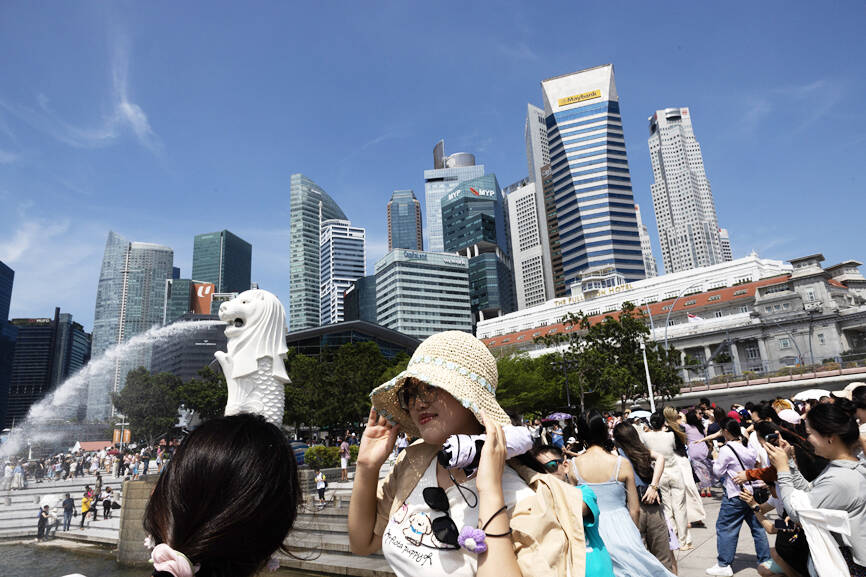Singapore’s electronics shipments grew the most since 2010, fueled by overseas sales of ICs and disk media products, as a global technology boom is proving a boon to the city-state.
Electronics exports rose 35.1 percent last month from a year earlier, following a revised increase of 16.8 percent the previous month, data released yesterday by Enterprise Singapore showed.
That was the fastest growth since June 2010.

Photo: EPA-EFE
The robust performance of electronics is providing the momentum for Singapore to meet, if not surpass, its GDP forecast of growing at the upper half of its 1 percent to 3 percent projected band.
The city-state is home to some of the largest chip manufacturing plants in Southeast Asia. Singapore and the broader Southeast Asia region are benefiting as companies diversify their tech supply chains beyond Taiwan and China to reduce risks related to tensions between Washington and Beijing.
“There is market talk that China is front-loading chips in anticipation of potential trade tariffs from the US that are targeted at China,” Oversea-Chinese Banking Corp (華僑銀行) chief economist Selena Ling (林秀心) wrote in a note. “Many uncertainties remain due to the US-China confrontation.”
Global tech companies have announced billions of dollars of fresh investments in the region this year, encouraged by demand for new services such as generative artificial intelligence.
Still, trade-reliant Singapore has reason to be cautious as non-oil domestic exports were up 10.7 percent, below the 15 percent median forecast in a Bloomberg News survey.
Month-on-month, overseas sales declined by 4.7 percent, reversing the 12.2 percent expansion in July.

When an apartment comes up for rent in Germany’s big cities, hundreds of prospective tenants often queue down the street to view it, but the acute shortage of affordable housing is getting scant attention ahead of today’s snap general election. “Housing is one of the main problems for people, but nobody talks about it, nobody takes it seriously,” said Andreas Ibel, president of Build Europe, an association representing housing developers. Migration and the sluggish economy top the list of voters’ concerns, but analysts say housing policy fails to break through as returns on investment take time to register, making the

‘SILVER LINING’: Although the news caused TSMC to fall on the local market, an analyst said that as tariffs are not set to go into effect until April, there is still time for negotiations US President Donald Trump on Tuesday said that he would likely impose tariffs on semiconductor, automobile and pharmaceutical imports of about 25 percent, with an announcement coming as soon as April 2 in a move that would represent a dramatic widening of the US leader’s trade war. “I probably will tell you that on April 2, but it’ll be in the neighborhood of 25 percent,” Trump told reporters at his Mar-a-Lago club when asked about his plan for auto tariffs. Asked about similar levies on pharmaceutical drugs and semiconductors, the president said that “it’ll be 25 percent and higher, and it’ll

NOT TO WORRY: Some people are concerned funds might continue moving out of the country, but the central bank said financial account outflows are not unusual in Taiwan Taiwan’s outbound investments hit a new high last year due to investments made by contract chipmaker Taiwan Semiconductor Manufacturing Co (TSMC, 台積電) and other major manufacturers to boost global expansion, the central bank said on Thursday. The net increase in outbound investments last year reached a record US$21.05 billion, while the net increase in outbound investments by Taiwanese residents reached a record US$31.98 billion, central bank data showed. Chen Fei-wen (陳斐紋), deputy director of the central bank’s Department of Economic Research, said the increase was largely due to TSMC’s efforts to expand production in the US and Japan. Investments by Vanguard International

WARNING SHOT: The US president has threatened to impose 25 percent tariffs on all imported vehicles, and similar or higher duties on pharmaceuticals and semiconductors US President Donald Trump on Wednesday suggested that a trade deal with China was “possible” — a key target in the US leader’s tariffs policy. The US in 2020 had already agreed to “a great trade deal with China” and a new deal was “possible,” Trump said. Trump said he expected Chinese President Xi Jinping (習近平) to visit the US, without giving a timeline for his trip. Trump also said that he was talking to China about TikTok, as the US seeks to broker a sale of the popular app owned by Chinese firm ByteDance Ltd (字節跳動). Trump last week said that he had